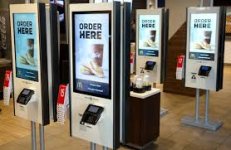Yup. The rising cost of unskilled labor (a.k.a. minimum wage) is eliminating jobs and replacing them with kiosks. A lot of us predicted exactly this when the "make minimum wage a living wage" movement started screaming for $15 an hour to be the new minimum wage a few years ago.
Employers can't pay employees more in wages than their work generates in profits and still stay in business. It's simple math.
For example: if an employee is being paid $15 and hour, and their medical insurance, employer paid taxes, workman's comp, etc. cost another $10 an hour then it costs the employer a total of $25 an hour for that employee to work there.
If a retail operation is making an average net profit of 5% on sales, then that employee has to generate $500 an hour in sales, every hour they work, just for the employer to afford to pay them. That's $4,000 in sales per day per employee.
In a fast food setting for example, with a couple of people working the cash registers, a couple cooking the food, and a couple more prepping, packing, and bagging the food, six employees working means the fast food has to make $3,000 an hour in sales ($24,000 per 8 hour shift) to be profitable.
Even if the profit margin doubles to 10% it still requires $1500 per hour minimum in sales - every hour - for the restaurant to pay for a crew of 6. That's $12,000 in sales every 8 hour day and that cost of doing business never ends or even goes down.
Suppose that a kiosk replaces just the two cash register employees. That is $50 an hour in savings. In the example above with a 5% profit margin that reduces the required sales from $3,000/hr ($24,00 per shift) to $2,000/hr ($16,000 per shift). It doesn't take very long at that rate for the savings to completely pay for the kiosk, and once it is paid for there isn't a whole lot of ongoing maintenance cost.
Even in a higher profit margin setting like the 10% profit margin example above the kiosk still reduces the required sales levels from $1,500/hr ($12,000 per 8 hour day) to $1,000/hr ($8,000 per 8 hour day). So the kiosk still pays for itself in a short period of time and continues to provide additional savings (profits) once it is paid for.
Plus kiosks don't make mistakes like entering the order wrong, or giving incorrect change. They don't steal from the till, call in sick, take breaks, take vacations or present any of the other thousand other problems that come with having employees. So I don't see a very rosy future for low skilled minimum wage jobs in retail settings. Especially as minimum wage rates and benefit costs keep climbing.


